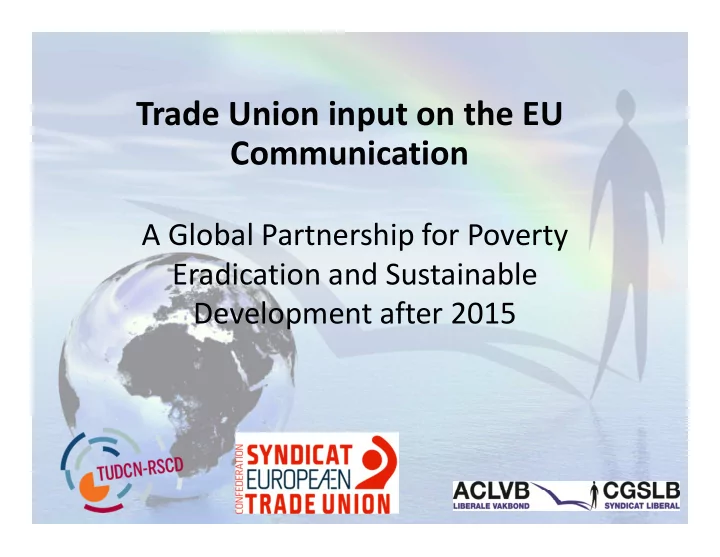

Trade Union input on the EU Communication A Global Partnership for Poverty Eradication and Sustainable Development after 2015
Focus of the Trade Union movement Since the debate on the POST-2015 Agenda started, the Trade Union movement asked for a stand alone goal on Full and Productive Employment and Decent Work for all and a goal on Universal Social Protection .
Overarching Principles � We welcome � Principle of shared responsibility � Rights base approach � inclusive forms of multi-stakeholder partnerships – including social partners � Trade unions regret that no reference is made to Decent Work in the overarching principles. � Although we recognize the challenges associated with poverty eradication and climate change issues, we strongly call for providing adequate financial resources for the implementation of commitments in both processes.
Remarks concerning the key components: 1. An enabling and conducive policy environment Positive aspects: � The inclusion of legal frames that promote and protect human rights, core labour standards… � Promote access to decent jobs with sustainable and adequate social protection for all � We welcome the reference to green economy transformation and climate change actions, as well as, just tax policies promotion
Areas of concern: � We strongly regret the absence of social dialogue when referring to accountability systems, democratic processes and providing an enabling environment for the private sector. � Social Dialogue and collective bargaining play a crucial role in ensuring fair wage distribution , while also tackling informality. Addressing the issue of the “working poor” constitutes one of the most important priorities to fight inequality. � We stress the importance of supporting labour inspection as a means to grant monitoring and control of the implementation of all the standards, conventions and laws in all production sectors.
2. Mobilization and effective use of domestic public finance: � We welcome the reference to green economy transformation and climate change actions, as well as just tax policies promotion (progressive taxation). � We share the demand for transparency and accountability including disclosure of payments by companies to governments, and eradication of tax havens. � We welcome the strong support for meeting the UN target of 0,7% ODA
3. International public finance: Areas of concern � Trade unions insist on greater transparency and accountability for blending mechanisms, which can become instruments for tied aid. � Funding for climate should be “new AND additional” like said at the Copenhagen summit. � We also highlight the additional role of the FTT in development financing.
4. Trade: Areas of concern � All countries must avoid giving up, via trade agreements, national tools for structural transformation and their capacities to define policies that would generate state income and create decent work. � Labour standards are gravely affected by global trade and investment patterns. Investment treaties and agreements should guarantee the enforceability of national labour laws and internationally recognized core labour standards.
5. Domestic & International Private sector: Areas of concern � Business compliance to binding social and environmental standards must be granted if we want to achieve sustainable development. � It is surprising that the Accord is mentioned as a “successful initiative of business”. The Accord is a binding agreement between social partners (employers and workers organizations), offering a tangible example on the relevance of social dialogue.
6. Migration � We welcome that migration is given a specific and quite detailed link with Development, specifically the issue of portability of earned social security benefits, skills recognition, protection against high charges, combating discrimination. � However, we regret the lack of mention of coverage by social protection floors and universal health coverage in particular. � Skills recognition is crucial and there should be reference to the need for international agreements and frameworks for skills recognition.
Key Components of Global Partnership • We call for an inclusive and multi-stakeholder global partnership based on binding commitments for all development actors. • We welcome a global partnership based on “already established systems for monitoring and accountability such as those established under international agreements”. • It is important to highlight the ILO framework as a ‘living’ example on how accountability mechanisms can work at global level through to the national level.
Thank you for your attention.
Recommend
More recommend